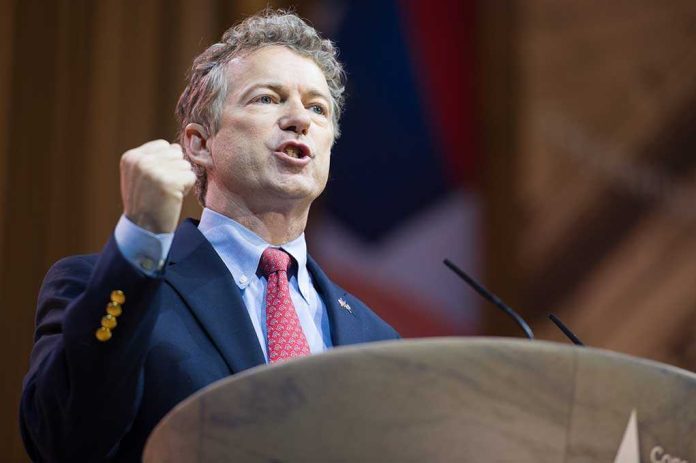
Senator Rand Paul warns that the Republican Party is inching towards a fracture, as divisions over President Trump’s foreign policy and spending grow deeper.
Story Highlights
- Rand Paul criticizes Trump’s military actions in Venezuela, predicting GOP division.
- Internal GOP conflicts escalate over controversial spending and foreign policy.
- Trump’s leadership style and policy decisions face backlash from within the party.
- Potential GOP fracture could impact future elections and party unity.
Rand Paul’s Warning of a GOP Fracture
Senator Rand Paul has publicly predicted that the Republican Party will “fracture” due to deepening internal divisions, particularly over President Donald Trump’s policies, controversial legislative efforts, and recent foreign interventions.
Paul, a prominent libertarian-leaning Republican, criticized the administration’s military strikes on Venezuela, noting that these actions could erode support for Trump within the party. This critique is especially significant given Paul’s previous support for Trump, marking a pivotal shift in his stance.
Paul’s prediction comes amid a backdrop of increasing Republican infighting. The Trump administration’s decision to designate Venezuela’s Cartel de los Soles as a terrorist organization and its military interventions have sparked controversy among libertarian and moderate Republicans alike. These actions, along with Trump’s aggressive legislative packages, have heightened tensions within the GOP, threatening to split the party into factions.
Internal Divisions and Party Dynamics
The Republican Party, already navigating through ideological splits between traditional conservatives, populists, and libertarians, faces new challenges under Trump’s second term. The administration’s focus on expansive legislation, like the “One Big Beautiful Bill Act,” has divided opinions on spending and tax policies. Recent electoral losses in key states and shifting public opinion further complicate the party’s ability to present a unified front ahead of upcoming elections.
Trump retains significant influence within the party, yet faces growing resistance from both ideological wings and pragmatic moderates. This internal conflict is exacerbated by the administration’s controversial economic policies and rising public disapproval. As the GOP holds a narrow majority in Congress, maintaining internal unity is crucial for legislative success, but the current climate suggests a growing risk of factionalism.
Potential Impact on GOP and Future Elections
The implications of a potential GOP fracture are significant. In the short term, the party risks legislative paralysis and a possible government shutdown. Long-term effects could include a formal party split, weakened electoral prospects, and a diminished ability to govern effectively. Republican lawmakers are caught in a dilemma, balancing party loyalty with constituent interests as they navigate these turbulent times.
As the party grapples with these challenges, the broader political landscape could shift. The GOP’s internal struggles may provide an opportunity for Democrats to capitalize on Republican disarray, potentially altering the balance of power in future elections. The unfolding situation requires close attention as the Republican Party’s direction hangs in the balance.
Sources:
Rand Paul predicts GOP will ‘fracture’ over Venezuelan strikes
Trump’s grip on Republican Party weakens amid internal conflicts
Republican fractures multiply over Trump’s legislative efforts
MAGA crackup: Internal GOP conflict intensifies




